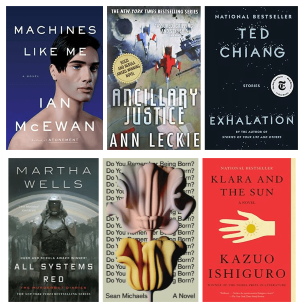Summary | Excerpt | Reviews | Beyond the Book | Read-Alikes | Genres & Themes | Author Bio

A Novel
by Anton HurThis article relates to Toward Eternity
 As artificial intelligence has become an ever-present part of our world, more and more authors have considered its ramifications on our society. In recent years alone, a slew of novels and short stories have been published that explore themes like human nature, scientific progress, love, and human connection through the eyes of characters who are not fully human. Anton Hur's debut novel, Toward Eternity, is just one of these. Below are some others.
As artificial intelligence has become an ever-present part of our world, more and more authors have considered its ramifications on our society. In recent years alone, a slew of novels and short stories have been published that explore themes like human nature, scientific progress, love, and human connection through the eyes of characters who are not fully human. Anton Hur's debut novel, Toward Eternity, is just one of these. Below are some others.
Klara and the Sun by Nobel laureate Kazuo Ishiguro follows the titular character Klara, an "Artificial Friend" who is purchased by a family for use as a companion for their young daughter, Josie. Klara's narration is infused with a sort of childlike wonder as she discovers the natural beauty of the world around her—the stark differences between her and Josie acting as the lynchpin for Ishiguro to explore this novel's themes.
Machines Like Me by Ian McEwan, author of Atonement, takes place in an alternate-reality London in the 1980s. The UK has lost the Falklands War and Alan Turing has achieved a breakthrough in artificial intelligence. Two lovers, Charlie and Miranda, together design Adam, a synthetic human whom they each imbue with their desired personality traits. When a love triangle starts to form, this novel asks whether an artificial being can ever truly understand what it means to love.
In Do You Remember Being Born? by Sean Michaels, poet and mother Marian receives an invitation from the Tech Company, offering her the chance to co-author a poem with their poetry bot. While Marian initially resists, unwilling to compromise her artistic integrity, she is ultimately unable to refuse the money being offered and enters into a contract that challenges her ideas about kinship and creativity.
While the above novels are more on the literary side, there have, of course, been plenty of science fiction novels and short story collections in recent years to engage with the concept of AI.
Ted Chiang, who wrote the story on which the 2016 film Arrival was based, also authored the collection Exhalation, published in 2019. The entire collection explores human themes through a scientific lens, and "The Lifecycle of Software Objects" presents the possibility of AI beings taking on parent-child relationships with people.
Ancillary Justice by Ann Leckie is set on a remote planet, and its protagonist is an "ancillary," or a human body whose consciousness is tied to the artificial intelligence of a giant spaceship. It's a novel about revenge and imperialism, but also raises existential questions about the humanity of ancillaries.
The Murderbot Diaries, a series of novellas by Martha Wells beginning with All Systems Red, introduces a race of cyborgs—part robot, part organic. One of these cyborgs spends time with humans and begins to form feelings and emotional connections, which leads it to interrogate the meaning of life.
While all of these books engage with similar themes, covering different genres and narratives between them, no easy conclusions are drawn by their authors. Is artificial intelligence an asset to scientific progress or a destructive force? Can its entities know what it means to be human, or are they just a soulless mimicry of humanity?
Filed under Reading Lists
![]() This article relates to Toward Eternity.
It first ran in the July 17, 2024
issue of BookBrowse Recommends.
This article relates to Toward Eternity.
It first ran in the July 17, 2024
issue of BookBrowse Recommends.
Your guide toexceptional books
BookBrowse seeks out and recommends the best in contemporary fiction and nonfiction—books that not only engage and entertain but also deepen our understanding of ourselves and the world around us.